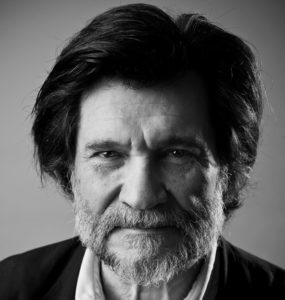Workshop in teh Countryside – Víctor Erice. From analog to digital imaging and other stories.
December 13, 14 and 15, 2019.

Of all Spanish film directors, one of the most appreciated and studied by moviegoers and critics of the seventh art.
Creator of some of the most beautiful and unforgettable scenes in the history of cinema
Description of the workshop:
The experience that cinema went through at the end of the twentieth century brought with it a kind of death certificate, something that from certain critical positions was understood as “the death of cinema”. Cinema, it was said as an eulogy, will no longer be the same age as a man. Independently of what each of us may think of this claim, at that moment of mourning a new era was inaugurated. Video became dominant everywhere, the analogue image began to be replaced by the digital one. A mutation that has left in the air the idea of the end of cinema as an artistic form.
That said, the current enslavement to new technologies often generates a devastating fetishism. Because cinema, at least as I have perceived it, has not been so much a technique for displaying images as an art that reveals things about the world.
Something that is increasingly difficult to find in the audiovisual field. Everything can be changed in a digital image: the figure, the landscape, the light, the colour, the framing. Our possibilities of control and dominance have grown, but at the same time the complexity of gestures, their element of mystery, the intervention of chance that sometimes leads to a moment of revelation have all diminished. More than capturing images, it is now customary to manufacture them. This contemporary thrust is a world away from of the imprint of the film maker left by the Lumière brothers, where the world and its appearances emerged from the photochemical image in a manner that we could consider as “natural.” If we abandon this type of imprint, can we say that in some sense we are leaving cinema behind?
In short, more than the question of whether the art may or may not survive, perhaps the really worrying thing is that the absolute power that digital calculation exerts on the image nowadays means that the issue is no longer about changing the world but changing only the image of the world.
These and other questions – which in part will arise at random – will, in the first instance, be the subject matter of the workshop.
The workshop includes daily morning and afternoon sessions, debates and film viewings.
As a complement to the main sessions, anyone who wishes may watch films after each daily session.
The classroom will remain open 24 hours a day.
Audience:
The workshop is intended for filmmakers, video artists, producers, teachers and students of Cinema, Fine Arts, Audiovisual Communication or Sound and Image, scriptwriters, writers, actors and anyone interested in cinema.

© Alessio Pizzi Cannella.
Studied in Madrid, in the Official School of Cinematography (EOC), gaining his diploma in the area of Film Directing. He worked for a time as a scriptwriter and later as a producer of advertising films.
In 1969 he made his début as a professional director filming one of the three episodes of Los Desafíos. In 1973 he made his first full-length
film, El Espíritu de la Colmena, which won the Golden Shell at the San Sebastián International Film Festival. In 1983 he directed an unfinished work, El Sur. 1992 was the year of El Sol del Membrillo, made in collaboration with the painter Antonio Lopez, and presented at the Cannes Film Festival, where it obtained the Jury Prize and the International Critics’ Prize (FIPRESCI).
In 2002 he made Alumbramiento, an episode of Ten Minutes Older: The Trumpet, a feature film in which a series of well-known international directors intervened. In 2005, in response to a request from the Centre of Contemporary Culture of Barcelona, and in the context of the exhibition Erice-Kiarostami: Correspondences, he began work on a series of video shorts called Cartas a Abbas Kiarostami. With the same motive, in December 2005 he wrote and directed La Morte Rouge, in which he evokes the first film-going experiences of a child of the postwar period. At the same time he also created an installation for museums based on several paintings by Antonio López, called Fragor del Mundo, Silencio de la Pintura. Over the same period he also worked sporadically on a documentary series called Memoria y Sueño.
In the year 2011 he made Ana, Three Minutes, an episode of the international feature film A Sense of Home. And in 2012 he made in Portugal what is till now his latest film, Vidros Partidos (Broken Panes), which forms part of the feature film Centro Histórico, in which Manoel de Oliveira, Pedro Costa, and Aki Kaurismaki also take part as directors.
Prices:
350 € (Workshop + full board and lodging in the Casa dos Muros + light snacks during the workshop)
or
330 € (Workshop + full board (without lodging) + light snacks during the workshop)
*** IMPORTANT NOTE:
No mobile phones and no recording of any kind – audio or visual – will be permitted during workshop sessions.
Schedule:
- Friday, December 13: Introduction and Workshop. 18:00 hrs – 20:00 hrs
- Saturday, December 14: Workshop. 10:00 hrs – 14:00 hrs / 16:00 hrs – 20:00 hrs
- Sunday, December 15: Workshop. 10:00 hrs – 14:00 hrs
